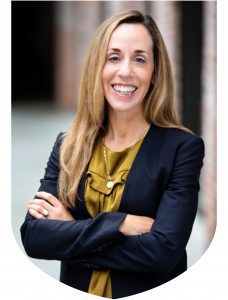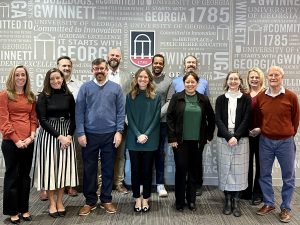
IOMP Graduation (photo courtesy of Dr. Brian Frost/IOMP)
The UGA Graduate School offers an array of graduate programs to enhance and support current working professionals. The Professional Master’s Program in Industrial-Organizational Psychology (IOMP) is one such program, designed for working professionals seeking to pursue graduate education in a collaborative, practitioner-focused format.
To learn more about the program from a graduate student’s perspective, we asked Dr. Beth Duggan, Anesthesiologist and IOMP Graduate Student, to share her experience with the program and how it has impacted her career.
 Graduate Student Perspective: Dr. Beth Duggan
Graduate Student Perspective: Dr. Beth Duggan
Please tell us about yourself and your career.
Professionally, I am an anesthesiologist, working in a tertiary acute care hospital setting caring for patients undergoing major surgery. Prior to joining the IOMP program at UGA, I completed my medical training at the University of Virginia, and my internship, residency and fellowship at Duke University Medical Center and the Hospital of the University of Pennsylvania. I am currently an Associate Professor at the University of Alabama Birmingham Department of Anesthesiology and Perioperative Medicine and regularly teach residents and medical students in the operating rooms, lecturing and writing as often as I can find the time.
I am actively involved in my specialty at large, working to improve patient care as well as our discipline’s commitment to research and education. Most recently, I have been involved in efforts to improve physician wellbeing through organizational efforts, which has put my IOMP degree knowledge to work.
I am also blessed to have married my best friend (who provided limitless support when I decided to pursue a master’s degree), and we have two kids (who were 6 and 8 years old when I started the program).
Why did you decide to pursue this Master’s program?
With the support and mentorship of my previous department chair, I was able to grow as both a clinical anesthesiologist and as a department leader holding various administrative roles within the hospital. When promoted to the Chief of Service for the General, Transplant, Vascular, and Neuroanesthesiology Division, I faced new (and at times unexpected) challenges. I quickly realized that to be a more effective and impactful service chief, I needed to grow my knowledge and understanding of leadership, professional development, and work attitudes. Additionally, I wanted to be able to apply this information and advocate for change within my organizational context—in other words, how could I best take action to support my colleagues in their work environment, but also positively influence culture and change at an organizational level?
Several of my colleagues directed me to pursue an MBA program—looking into the coursework however, I knew this was not the right fit. I wanted to appreciate and measure factors that encourage physicians to thrive but also, to identify and understand the environmental constraints that contribute to fatigue, dissatisfaction, and detachment. Prior to COVID-19, physician burnout was identified as a public health care crisis; today, it presents a significant challenge to the delivery of optimal and safe patient care. If we want to encourage physicians to remain in practice, to passionately engage with patients, to pursue novel research, and to provide individualized care, we need to understand the interaction between work environments and employee attitudes.
At that point in my career, I had limited experience with coursework in this realm. Exploring options, organizational psychology emerged as the discipline leading work in these areas of study. Looking at local programs—and knowing I needed an executive degree–I reached out to Dr. Brian Frost, the Program Director at UGA. He immediately returned my e-mail, set up a call, and then spent almost two hours chatting with me about industrial and organizational psychology as a field of study. The knowledge I was seeking, the language I needed, and the expertise I desired was undoubtedly within the coursework offered in the program.

Dr. Beth Duggan (left) and the IOMP Faculty (photo courtesy of Dr. Beth Duggan/IOMP Graduate)
What were some notable aspects of the IOMP?
The program offers several assignments and challenges that provide the opportunity to translate learned knowledge into applied experience which offers tangible benefits to the students. Specific to my career (past and current), there were two unique benefits. The first is that the program routinely outlines scientific data in the curriculum, approaching the concepts using exploratory study. Medicine does the same- we observe a phenomenon to conceptualize the role it plays in human physiology, we measure its relationship to known data points to improve our understanding, and finally, we design interventions to impact the variable to mitigate disease and improve health. The scientific language of applied psychology allows me to translate my knowledge more effectively; frequently, my colleagues are surprised to find out that this field is defined by scientific theory.
On a more personal level, the most important aspect of the program was the commitment the professors made to my learning and success outside of the curriculum.
Every professor in the program has extended their time, effort, and expertise beyond the classwork to support my career. This includes connecting me to individuals in their professional networks, writing articles for publication, co-presenting lectures and panels for national conferences, and always being available for questions and advice. More than a year after graduation, I can still reach out to any of the professors in the program when I need direction for (yet another!) project. The program catered their deliverables to meet my career needs, my passions and interest, and my evolving professional self—and for this I will always be grateful.
How has the IOMP impacted your career?
The IOMP has been the backbone on which I have renewed my commitment to the practice of medicine. Participating in patient care and being able to teach trainees is a privilege; seeing this work through a new lens has served as a powerful reminder of how lucky I am to work in the perioperative space.
Participating in this partnership revived my commitment to academics and
restored my sense of career meaning.
Additionally, the program gave me the courage to change career directions. I left my previous role choosing to focus my efforts on physician development, career meaning, and to build a more supportive culture in medicine. With the support of my current chair, we have created a unique effort labeled the Culture Collaborative. We partner leaders in recruitment, retention, wellness, DEI, and professional development to create a multi-tiered effort to meet the needs of our unique faculty more inclusively such that we improve physician engagement, job satisfaction, and career longevity.
External to my department, the expertise has allowed me to influence my specialty more effectively. Medicine is interested—and in fact, desperate for—this knowledge. The degree has provided me with a platform to enact change, and I am hopeful that these powerful partnerships will continue to unite our unique perspectives to bring much needed change to healthcare environments.
Would you recommend this program to others? Why?
Absolutely. As a professional, this program strives to meet the unique needs of its students from varied career pathways, at all stages of life, and by providing a wide range of academic learning experiences.
Quoting Dr. Neal Outland, “We are perhaps not at our best when working as independent, permanent selves but, when we are interdependent and constantly changing.” The program requires students to explore novel concepts, to challenge current patterns of thinking, to apply knowledge to working environments, and to partner to achieve success; the goal being that each student emerges with a stronger foundation of knowledge, the ability to employ expertise across varied field and domains, and the confidence to pursue continued learning and career growth.
Learn more about the I/O Psychology Master’s Program
